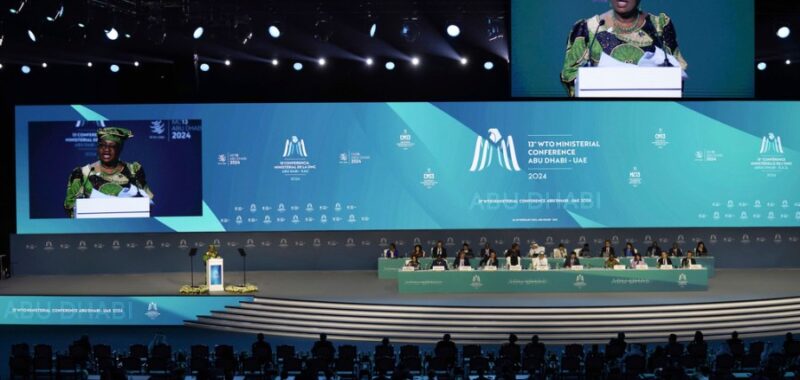
As the 2024 election season heats up, America’s $785 billion trade deficit will be a hot topic. But while it’s easy to blame the Trump or Biden administrations, the real culprit is the World Trade Organization. This institution, designed to create a level playing field for international trade, has instead become an obstacle to improving our trade balance.
Since its inception, the WTO has tilted the scales against the U.S. Congress approved our entry into the WTO in 1994, and by 2000, our trade deficit had doubled as a percentage of GDP. Then, we made another fateful decision: granting China Permanent Normalized Trade Relations status upon its WTO admission. This exempted China from annual congressional review, with the expectation was that this would help reduce our trade deficits. Instead, our trade deficit surged another 40 percent before Donald Trump took office in 2017.
The WTO isn’t the sole reason for our deficits, but it’s the biggest one. We do need a rules-based mechanism for global trade, but the current system is far from equitable. The WTO’s flaws are glaring and persistent.
One of the most egregious issues is the self-declaration of “developing country” status, which allows nations to receive special trade benefits. There are no strict criteria for this designation, leading 80 percent of WTO members, including China — the world’s second-largest economy — to claim it. As a result, the U.S. is forced to grant trade concessions to China, even though they are our largest source of trade deficits. This makes no sense, especially when China’s per capita net-worth vastly outstrips that of genuinely developing nations like India.
Our negotiators agreed to these terms decades ago, but what might have made sense then is now deeply problematic. The U.S. ends up making permanent concessions to most other WTO members, which hampers our ability to negotiate bilateral trade agreements. Why would other nations bother negotiating when they already have a deal that favors them? This is why the U.S. has so few bilateral trade agreements compared to countries like Mexico, which has almost 100.
The WTO’s dispute resolution process is another area where the U.S. gets the short end of the stick. Panels are skewed toward countries with positive trade balances, not neutral adjudicators. The U.S. has been the defendant in a quarter of all WTO cases, and we’ve lost 90 percent of them. It’s ludicrous to suggest that the U.S., with the largest trade deficit, is somehow the biggest violator of international trade laws.
The treatment of Value Added Tax (VAT) is particularly troubling. Many countries rebate the full amount of VAT on exported goods, making them cheaper in the U.S. than in their home countries. Meanwhile, U.S. goods face VATs and tariffs abroad, pricing them out of foreign markets. When the U.S. tried to offset this imbalance with new tax rules, the WTO ruled against us, essentially telling us to change our entire tax system. By what authority does the WTO dictate U.S. tax policy?
Even when the WTO rules are clear, its enforcement is sluggish. The organization’s charter requires appellate decisions within 90 days, yet cases often drag on for years. The Boeing-Airbus subsidy case, for instance, took more than 17 years to resolve. Such delays render the dispute resolution process nearly useless, discouraging countries from even filing complaints.
The WTO’s shortcomings don’t end there. It fails to address critical issues like currency manipulation, intellectual property rights and barriers to service industries — all of which disproportionately affect the U.S.
Reforming the WTO should be a top priority, but this will only happen if the majority of members who benefit from the current structure are convinced that the alternative — a U.S. withdrawal — would be far worse. Trump has floated the idea of universal tariffs, which would likely force a U.S. exit from the WTO. For most WTO members, this would be catastrophic. The U.S., as the world’s largest importer, could inflict nearly a trillion dollars in damage on global trade — far more than what we would suffer.
Such a drastic move would be dangerous, but less so for us than for others. Critics cite the Smoot-Hawley tariffs as a precursor to the Great Depression, but they forget that the global depression began a year before those tariffs were enacted.
Trump has indicated a willingness to take a hard line on the WTO. Democratic nominee Kamala Harris has yet to detail her trade policies, but she would be wise to advocate for reforming the WTO. Addressing our trade deficit shouldn’t be a partisan issue; it’s a national imperative.
Wilbur Ross was secretary of Commerce under the Trump Administration from 2017-2021. He is the author of “Risks and Returns: Creating Success in Business and Life.”

